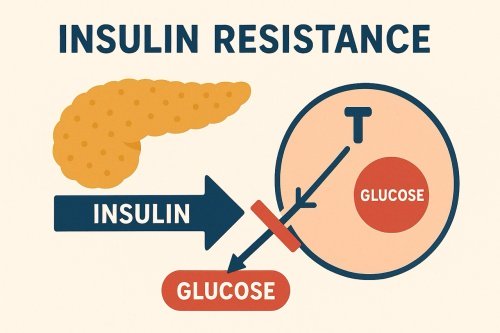Low progesterone
The problem of low progesterone seems to be an ever increasing one. There are many factors involved, some of which are...
- Insulin resistance
- Endocrine disruptors
- Stress
- A defective luteal phase (in women only)
- SAD (seasonal affective disorder)
- Oral contraceptives
- HRT
- Large carbohydrate meals
Insulin resistance
IR affects anything from 25-80% of the population, causing tiredness and weight gain in particular. In women it suppresses ovarian function, leading to anovulation, which in turn leads to low progesterone levels. It is essential to reverse IR for ovarian function to return to normal (see polycystic ovaries).
Endocrine disruptors
There are now over 90 endocrine disruptors, most mimic oestrogen in their action. Now found in our food, air, water, skin care products, plastics and many more, their affect on humans and animals is to increase cellular division in hormonally receptive tissues. Although the jury is still out, there are now many studies proving their influence. Excessive oestrogen suppresses progesterone.
Stress
Dr Hans Selye wrote the first definitive study on stress. He identified three progressive stages in the body's reaction to it...
- alarm
- resistance
- exhaustion
The final stage results in the exhaustion of the stress fighting adrenal glands and the immune system glands the thymus and lymph. This has multiple affects throughout the body, leading to many of the modern degenerative diseases. The adrenals make over 70 hormones. Exhausted adrenals cannot cope with the demands made on them, so levels of some hormones drop. Low progesterone is an inevitable result. This is due in part to the rise in two hormones, cortisol and adrenalin, the two stress hormones, which suppress progesterone.
A defective luteal phase (in women)
This is an ever increasing problem in women, due in part to insulin resistance, endocrine disruptors, stress or the use of oral contraceptives. After ovulation, when the corpus luteum is making progesterone, which it should make for fourteen days, the level falls earlier than it should, causing spotting to occur a few days before the full period. This in turn leads to difficulties in falling pregnant and miscarriages. The low progesterone level can be raised using supplemental progesterone during the last fourteen days of the cycle.
SAD (seasonal affective disorder)
Seasonal affective disorder (also known as 'SAD') is caused by the long nights experienced in high latitudes. Normal treatment is to make the sufferer extend the daylight hours with artificial lighting. Researchers have found that long nights cause a drop in the level of progesterone in the blood.
People have lived for centuries in high latitudes without suffering from the condition. The obvious question is 'why now?' There is some evidence to support a correlation between the incidence of the disorder and the rise in environmental oestrogens. Progesterone is a powerful antagonist to oestrogen.
Oral contraceptives
All OC's suppress ovulation. It is only when a woman ovulates that the ovaries make progesterone. By suppressing ovulation the luteal phase surge in progesterone does not take place, so levels stay at those found in the follicular phase. The little progesterone present is made by the adrenals, brain and glial cells. If the adrenals are stressed the level drops even lower. All OC's cause insulin resistance, which also suppresses ovarian function.
HRT
Post menopausal women have naturally low progesterone levels. However, HRT contains the same synthetic hormones as the OC's, albeit in a smaller dose. The synthetic oestrogen suppresses progesterone. The progestin in HRT does not replace progesterone. Post menopausal women are still subjected to the same endocrine disruptors as everyone else, further increasing oestrogen levels. HRT also causes insulin resistance, which leads still further to slowing the metabolism.
Large carbohydrate meals
There is evidence progesterone levels drop after a large meal containing too many refined carbohydrates. Refined carbohydrates, in particular sugar and wheat, cause the blood sugar to drop too quickly. This causes adrenalin to rise, which in turn causes sugar stored in cells in the body, particularly the liver, to pour into the blood bringing the level up again. As the sugar drains out it is replaced by water, causing bloating and weight gain.
Progesterone cannot be transported into the nucleus of the cells if there is either no sugar in them or too much sugar, which means that any of the symptoms of progesterone deficiency become worse. (for more on blood sugar and low progesterone click here).
 Feeling tired, foggy, or struggling with stubborn weight gain—especially around the waist? You might be surprised to learn that these symptoms could be linked to insulin resistance, a condition that a…
Feeling tired, foggy, or struggling with stubborn weight gain—especially around the waist? You might be surprised to learn that these symptoms could be linked to insulin resistance, a condition that a… Are you struggling with irregular cycles, unwanted hair growth, or unexplained fatigue? You’re not alone. Polycystic Ovarian Syndrome (PCOS) affects up to 10% of women of reproductive age—and many mor…
Are you struggling with irregular cycles, unwanted hair growth, or unexplained fatigue? You’re not alone. Polycystic Ovarian Syndrome (PCOS) affects up to 10% of women of reproductive age—and many mor… While progesterone is often discussed in relation to reproductive health, emerging research reveals its remarkable role in supporting brain function and protecting against neurological decline. Proges…
While progesterone is often discussed in relation to reproductive health, emerging research reveals its remarkable role in supporting brain function and protecting against neurological decline. Proges… Incase you missed it!
Today is the last day for you to claim 15% off our Natpro 100ml Dispensers. The sale ends at midnight tonight.
How to Claim Your 15% Discount:
•Shop at
Incase you missed it!
Today is the last day for you to claim 15% off our Natpro 100ml Dispensers. The sale ends at midnight tonight.
How to Claim Your 15% Discount:
•Shop at